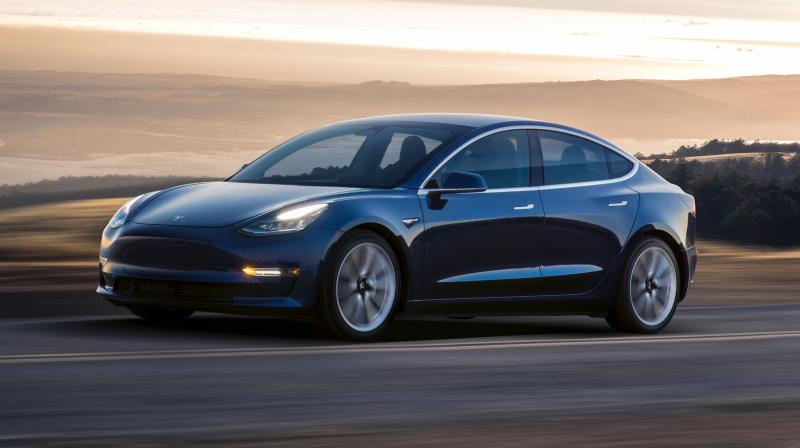Tesla shares jump as Musk delivers quarterly profit, cash

Tesla Inc reported a net profit, positive cash flow and wider-than-expected margins for the latest quarter on Wednesday, delivering on Chief Executive Elon Musk’s promise to turn the electric carmaker profitable as higher production volumes of its new Model 3 began to pay off.
Tesla reiterated that it expected to repeat its net profit in the current quarter, helping drive the company’s shares up 14 per cent in after-hours trading.
The controversial Musk, who has often set goals and deadlines that Tesla has failed to reach, surprised investors by delivering on his pledge to make Tesla profitable for only the third quarter in its 15-year existence, providing a positive end to a difficult quarter for the CEO whose leadership was openly questioned only weeks ago.
“We can actually be cash flow positive and profitable in all quarters going forward,” Musk said, qualifying that he excluded those in which a big debt payment comes due, such as the first quarter of 2019.
Musk reiterated that Tesla currently does not plan to raise equity or debt.
Tesla said it would begin taking orders in Europe and China for the Model 3 before the end of 2018. Deliveries would begin to Europe in late February or March, and those to China in the second quarter, if not before, Musk said.
Musk said he planned to begin local production in China next year in a ‘capital efficient manner,’ suggesting the company might use a similar tent structure for car assembly that has already been used at its Fremont, California, plant. He gave no further details on plans in China.
Meanwhile, seeking to quell speculation that a large number of prospective buyers had cancelled their reservations due to delays receiving their cars, Tesla said only 20 per cent of North American reservation-holders had cancelled their bookings.
Free cash flow at USD 881 million was positive for only the third time in Tesla’s history and was helped by a surge of a new production of the Model 3, lower capital expenditures, and more efficient use of working capital.
While still below the production target it set for June of 5,000 Model 3s per week, the roughly 4,300 Model 3s the company is now averaging per week was enough to boost results.
Despite pledges by Musk and Chief Financial Officer Deepak Ahuja to manage operations and future projects in a capital efficient manner, some on Wall Street still foresee a capital raising as likely at some point.
“(Raising cash) became a whole lot easier,” after Wednesday’s results, said Tigress Financial Partners analyst Ivan Fienseth. “He will need to do it, right? But if you got a profitable company it’s a whole lot easier to raise money.”
The results were a boost for the embattled company after a quarter in which US security regulators accused Musk of fraud for tweeting that he had secured funding for a deal to take the company private which never materialized.
A settlement between Musk, Tesla and the US Securities and Exchange Commission allowed Musk to remain as CEO but required a new independent chairman to oversee an array of capital- intensive new projects in 2019, from a factory in China to development of Tesla’s new Model Y SUV.
Musk had vowed since May that Tesla would be profitable in both the third and fourth quarters, and has repeated that the company would not need new capital from financial backers.
Tesla said earlier this month it built 53,239 Model 3 sedans in the quarter, in line with its target of 50,000 to 55,000 vehicles, and delivered 56,065 of the cars to customers.
Musk has been under intense pressure to prove he can deliver consistent production numbers for the Model 3, seen as crucial to Tesla’s profitability and its ability to be a high-volume car producer.
More sales of the higher-priced versions of the Model 3 currently on offer helped margins which rose to over 20 per cent in the quarter, Tesla said, above its projection of 15 per cent margins. Lower labour hours per vehicle helped, as did lower material costs.
Total revenue more than doubled to USD 6.82 billion, beating analysts’ average estimate of USD 6.33 billion, according to Refinitiv data.
Tesla ended the quarter with USD 3.5 billion in cash after spending USD 510.3 million in quarterly capital expenses. It said cash would remain at least unchanged in the fourth quarter, despite a repayment of USD 230 million in convertible notes coming due.
Tesla reported a profit of USD 311.5 million, or USD 1.75 per share, for the third quarter ended Sept. 30, compared with a loss of USD 619.4 million, or USD 3.70 per share, a year earlier.
Excluding items, earnings were USD 2.90 per share, versus an average analyst estimate of a loss of 19 cents per share. A Refinitiv SmartEstimate, which gives more weight to analysts with strong track records, estimated Tesla would earn 3 cents per share.
Tesla faces pressing cash needs at its Fremont, California factory, where the company has had a longstanding goal of eventually increasing production to 10,000 Model 3s per week. Musk said a goal of 7,000 was more realistic and would require significantly less capital spending.
Three new vehicles are in development at Tesla: the Model Y, a new USD 200,000 Roadster and an electric heavy-duty truck that Musk unveiled last November.
Its sprawling Gigafactory battery factory outside Reno, Nevada is only partially complete, and plans for assembly plants in Europe and China are both big-ticket items on the horizon.
